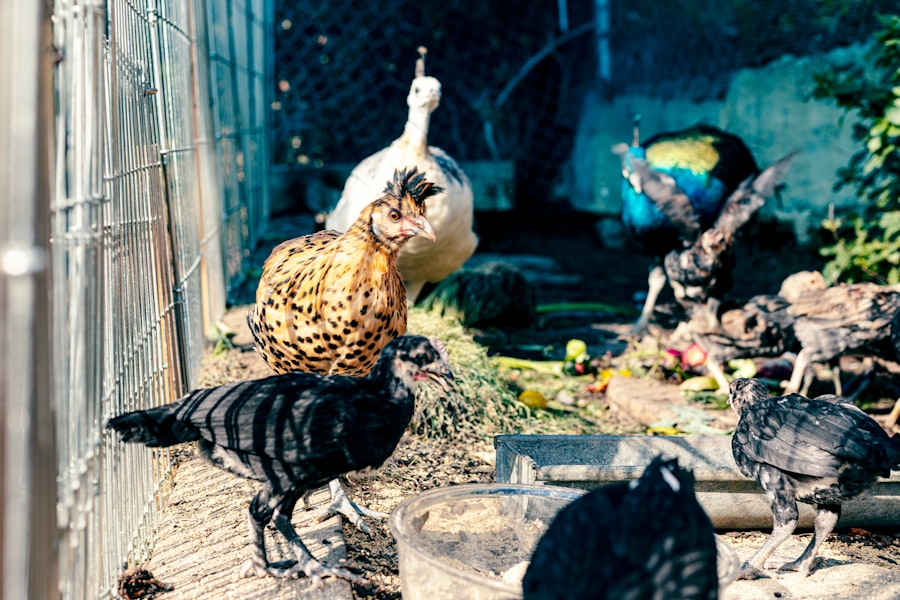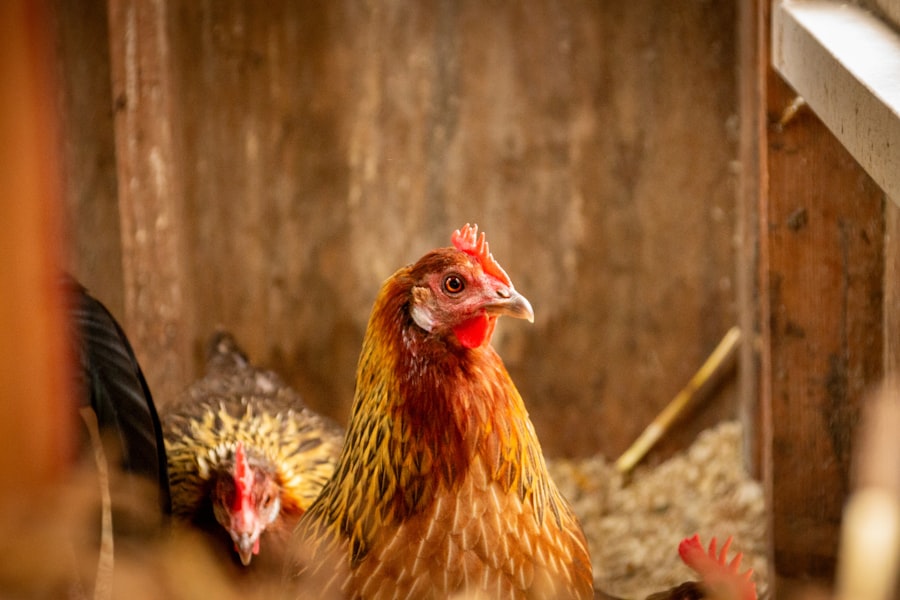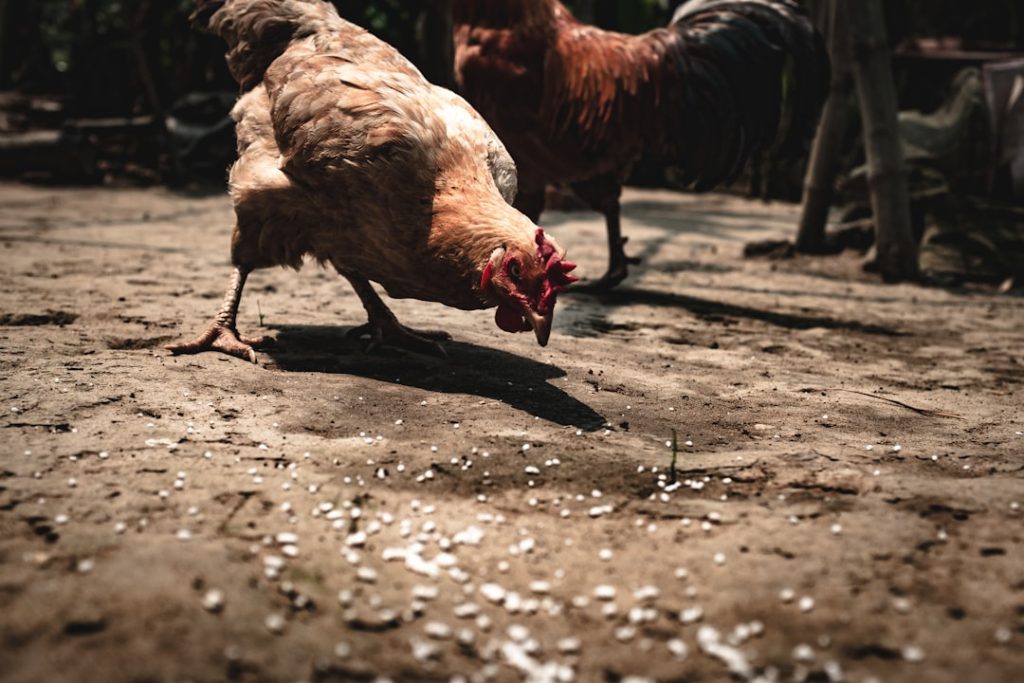When selecting chickens for a backyard coop, several factors should be considered. Climate is a crucial consideration, as some breeds are better adapted to cold weather, while others thrive in warmer conditions. The intended purpose of the chickens is also important, whether for egg production, meat, or dual-purpose use.
Popular egg-laying breeds include Rhode Island Reds and Leghorns, while Cornish Cross and Freedom Rangers are suitable for meat production. Breed temperament is another significant factor, especially for households with children or other pets. Some breeds are known for being docile and friendly, while others may be more skittish or aggressive.
The available space in the backyard should also be taken into account, as some breeds are better suited to confinement, while others require more room to roam. Bantams are a good choice for limited spaces, while larger breeds like Orpingtons or Australorps are better suited to free-range environments. Noise levels can be a concern, particularly in densely populated areas.
Some breeds are known to be more vocal than others, so selecting a quieter breed may be necessary to avoid disturbing neighbors. Ultimately, the ideal breed for a backyard coop depends on specific needs and preferences, and thorough research should be conducted before making a decision.
Table of Contents
- 1 Setting Up the Coop
- 2 Feeding and Watering
- 3 Health and Safety
- 4 Daily Care and Maintenance
- 5 Handling and Socializing
- 6 Troubleshooting Common Issues
- 7 FAQs
- 7.1 What are the basic requirements for keeping chickens?
- 7.2 What should I consider when choosing a chicken breed?
- 7.3 What do chickens eat and drink?
- 7.4 How do I keep my chickens healthy?
- 7.5 What are some common health issues in chickens?
- 7.6 How do I protect my chickens from predators?
- 7.7 How do I care for chicken eggs?
- 7.8 What are the legal considerations for keeping chickens?
Key Takeaways
- Consider the climate, space, and purpose of raising chickens when choosing the right breed for your coop.
- Ensure the coop is secure, well-ventilated, and has nesting boxes for the chickens to lay eggs.
- Provide a balanced diet of grains, greens, and protein, and ensure access to clean water at all times.
- Regularly inspect chickens for signs of illness, and keep the coop clean to prevent disease and parasites.
- Daily care includes collecting eggs, cleaning the coop, and providing social interaction and enrichment for the chickens.
Setting Up the Coop
Space and Ventilation
First and foremost, you’ll need to provide enough space for your chickens to roost, nest, and move around comfortably. The general rule of thumb is to allow at least 2-3 square feet of space per chicken inside the coop, and 8-10 square feet per chicken in an outdoor run. Additionally, make sure the coop is well-ventilated to prevent moisture buildup and ammonia fumes, which can lead to respiratory issues for your chickens.
Predator Protection
Another important aspect of setting up a coop is providing adequate protection from predators. Make sure the coop is secure and predator-proof, with sturdy walls and a roof to keep out unwanted visitors like raccoons, foxes, and birds of prey. Consider adding hardware cloth to windows and vents, as well as burying wire mesh around the perimeter of the coop to prevent digging predators like weasels or rats from gaining access.
Layout and Maintenance
Finally, consider the layout and design of the coop to make cleaning and maintenance as easy as possible. Include features like removable roosts and nest boxes, as well as easy access to food and water containers. Provide a secure locking mechanism for the coop door to keep your chickens safe at night. By taking these factors into consideration when setting up your coop, you can create a safe and comfortable environment for your backyard chickens to thrive.
Feeding and Watering

Proper nutrition is essential for keeping your backyard chickens healthy and productive. When it comes to feeding your flock, it’s important to provide a balanced diet that meets their nutritional needs at every stage of life. A good quality commercial feed formulated specifically for chickens is a great foundation for their diet.
Look for feeds that are appropriate for their age and purpose (e.g., starter feed for chicks, layer feed for hens), and consider options like organic or non-GMO feeds if that’s important to you. In addition to commercial feed, it’s important to supplement their diet with fresh fruits and vegetables, as well as kitchen scraps like leafy greens, carrots, and grains. This not only provides additional nutrients but also helps reduce food waste.
In addition to food, access to clean water is crucial for your chickens’ health and well-being. Make sure they have a constant supply of fresh water available at all times, especially during hot weather when they need to stay hydrated. Consider using a waterer with a base that prevents spillage and contamination, and clean and refill it regularly to prevent the growth of harmful bacteria.
In colder climates, consider using heated waterers to prevent freezing during winter months. It’s also important to monitor your chickens’ water intake, as changes in consumption can be an early indicator of health issues such as dehydration or illness. By providing a balanced diet and access to clean water, you can ensure that your backyard chickens stay healthy and happy.
Health and Safety
Maintaining the health and safety of your backyard chickens is essential for their overall well-being. Regular health checks are important for catching any potential issues early on. Keep an eye out for signs of illness or injury such as lethargy, abnormal droppings, respiratory issues, or changes in behavior.
Additionally, make sure your chickens are protected from common poultry diseases by practicing good biosecurity measures such as quarantining new birds before introducing them to your flock and keeping wild birds and rodents away from your coop. Another important aspect of maintaining your chickens’ health is providing a clean living environment. Regularly clean out the coop and nesting boxes to prevent the buildup of droppings and bacteria that can lead to respiratory issues or parasites.
Use natural bedding materials like straw or wood shavings that are absorbent and easy to replace. Additionally, provide dust baths for your chickens so they can keep themselves clean and free from mites or lice. In terms of safety, it’s important to protect your chickens from predators by ensuring that their coop and run are secure and predator-proof.
Consider installing motion-activated lights or sound devices to deter nocturnal predators like raccoons or foxes. It’s also important to provide adequate shelter from extreme weather conditions such as heat, cold, wind, and rain. By taking these measures to maintain the health and safety of your backyard chickens, you can help them live long and happy lives.
Daily Care and Maintenance
Caring for backyard chickens requires daily attention and maintenance to ensure their health and well-being. One of the most important daily tasks is collecting eggs. Make sure to gather eggs regularly to prevent them from being pecked or broken by other hens, as well as to keep them clean and fresh.
Additionally, check for any signs of illness or injury during daily interactions with your flock. Look for changes in behavior or appearance that could indicate a problem that needs attention. Another daily task is providing fresh food and water for your chickens.
Check their feeders and waterers daily to ensure they are clean and filled with fresh supplies. This not only ensures that your chickens have access to essential nutrients but also helps prevent the growth of harmful bacteria that can lead to illness. In addition to these daily tasks, it’s important to spend time observing and interacting with your flock on a regular basis.
This not only helps you monitor their health and behavior but also provides enrichment for your chickens by allowing them to socialize with you and each other. Consider spending time in the coop or run with your chickens, offering treats by hand, or simply sitting quietly while they go about their daily activities. Finally, regular maintenance of the coop and run is essential for keeping your chickens healthy and comfortable.
This includes tasks such as cleaning out droppings, replacing bedding materials, and checking for any signs of wear or damage that could compromise the safety of your flock. By staying on top of these daily care tasks and maintenance routines, you can ensure that your backyard chickens have everything they need to thrive.

Approaching Your Chickens with Care
When handling your chickens, it’s essential to approach them calmly and gently to avoid causing unnecessary stress or injury. Start by getting them used to being touched by offering treats from your hand or gently stroking their feathers while they eat. Over time, they will become more comfortable with being handled and may even seek out interaction with you.
In addition to handling, providing opportunities for socialization within the flock is vital for maintaining a harmonious environment. Introducing new birds gradually can help reduce stress and aggression within the flock. Providing enrichment such as perches, dust baths, or toys can help keep your chickens mentally stimulated and reduce boredom-related behaviors like pecking or feather picking.
Maintaining a Peaceful Flock
Spending time observing your flock’s social dynamics can help you identify any issues such as bullying or aggression between birds. By taking steps to address these issues early on through interventions like separating aggressive birds or providing more space within the coop or run, you can help maintain a peaceful and happy flock.
Troubleshooting Common Issues
Despite your best efforts in caring for your backyard chickens, it’s not uncommon to encounter common issues along the way. One common issue that many chicken keepers face is egg-eating behavior among their flock. This can be caused by boredom or overcrowding within the coop, leading hens to peck at eggs out of curiosity or frustration.
To address this issue, provide plenty of enrichment within the coop such as perches or hanging treats to keep your hens occupied. Additionally, make sure there is enough space within the nesting boxes so hens don’t feel crowded while laying eggs. Another common issue is feather picking or cannibalism within the flock.
This behavior can be caused by stress, overcrowding, or nutritional deficiencies. To address this issue, make sure your chickens have enough space within the coop and run to move around comfortably. Additionally, provide a balanced diet with plenty of protein-rich foods such as mealworms or black soldier fly larvae to prevent nutritional deficiencies that can lead to feather picking.
Mites and lice are another common issue that can affect backyard chickens. Regularly inspect your flock for signs of infestation such as red mites or lice eggs at the base of feathers. To address this issue, provide regular dust baths with diatomaceous earth or wood ash to help control external parasites.
Additionally, consider using natural remedies such as herbal sprays or essential oils to repel mites and lice from your flock. By staying vigilant and addressing common issues promptly with appropriate interventions, you can help ensure that your backyard chickens stay healthy and happy in their coop.
If you’re interested in learning more about the number of eggs geese lay, check out this article on Poultry Wizard. It provides valuable information on the topic and can help you expand your knowledge on poultry breeding.
FAQs
What are the basic requirements for keeping chickens?
To keep chickens, you will need a secure and predator-proof coop, a spacious outdoor area for them to roam and forage, access to fresh water and a balanced diet of chicken feed, and regular health checks and maintenance.
What should I consider when choosing a chicken breed?
When choosing a chicken breed, consider factors such as egg production, temperament, climate adaptability, and space requirements. Some popular breeds for beginners include Rhode Island Reds, Plymouth Rocks, and Sussex.
What do chickens eat and drink?
Chickens require a balanced diet of chicken feed, which can be supplemented with kitchen scraps, fruits, and vegetables. They also need access to fresh water at all times.
How do I keep my chickens healthy?
To keep chickens healthy, provide them with a clean and well-ventilated coop, regular access to fresh water and a balanced diet, and regular health checks for signs of illness or parasites.
What are some common health issues in chickens?
Common health issues in chickens include respiratory infections, mites and lice infestations, and egg-laying problems. It’s important to monitor your chickens for any signs of illness and seek veterinary care when necessary.
How do I protect my chickens from predators?
To protect your chickens from predators, ensure that their coop and outdoor area are secure and predator-proof. This may include using hardware cloth, burying wire mesh to prevent digging, and installing motion-activated lights or alarms.
How do I care for chicken eggs?
To care for chicken eggs, collect them daily, clean off any dirt or debris, and store them in a cool, dry place. It’s important to handle eggs gently to avoid cracking and to use them within a reasonable timeframe.
What are the legal considerations for keeping chickens?
Before keeping chickens, check your local zoning laws and homeowners’ association regulations to ensure that keeping chickens is allowed in your area. Some areas may have restrictions on the number of chickens you can keep or require permits.
Meet Walter, the feathered-friend fanatic of Florida! Nestled in the sunshine state, Walter struts through life with his feathered companions, clucking his way to happiness. With a coop that’s fancier than a five-star hotel, he’s the Don Juan of the chicken world. When he’s not teaching his hens to do the cha-cha, you’ll find him in a heated debate with his prized rooster, Sir Clucks-a-Lot. Walter’s poultry passion is no yolk; he’s the sunny-side-up guy you never knew you needed in your flock of friends!







